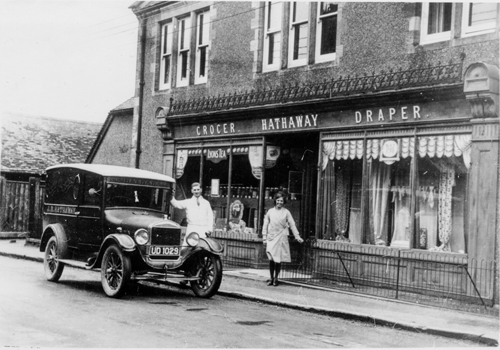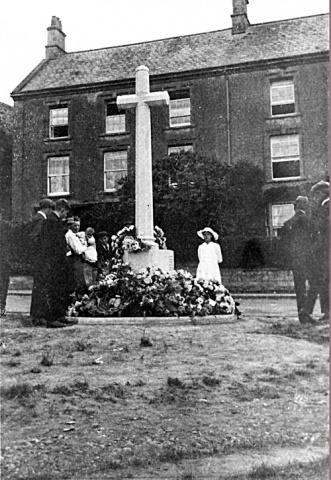This is an undated interview by Rachel Grant with Cyril Lane in two parts.
As a young boy, Cyril Lane came to stay with his mother’s family in Shipton for about six weeks every summer. His mother Adeline was a Dee and her family-owned Dees’ Stores in the centre of Shipton and quite a lot of land.

His father kept a school in Cheltenham and, when Cyril was old enough, he cycled to Shipton with his father. The highlight of the ride was a stop for refreshments at the New Barn Inn near Northleach.
His mother, younger siblings and two maids would come by train, being collected by pony and trap from Shipton station. Cyril remembers the fun he and his brothers had playing in the countryside around Shipton, including catching the silver washed fritillary butterflies in Bruern. Later he talks about going through the farm gate at the back of Parsonage Farm, before Prebendal House was built, to swim in the river.
Cyril thinks that the Shipton stores were built by his uncles and aunts around 1908 or 1909. (Journal 27 suggests it might have been earlier). Thomas and Harold Dee had emigrated to Canada (buying 640 acres of land in Manitoba) but Harold came back around 1910 to help his sisters run the business.
He operated several rounds through local villages, going out on his bicycle to collect orders and then delivering them by horse and trap. The business was extensive, and Cyril remembers they ordered two pig carcases to be delivered each week during the winter months. These they would make into sausages from their own recipe, bacon, brawn and lard.
His Aunt Mary was the Sunday school teacher and could be stern, however she was very kind to him when he was stung in the mouth by a wasp. This caused blood poisoning and he became very seriously ill, Aunt Ellen was more indulgent to Cyril and his brothers, letting them help themselves to sweets from the shop when everyone else was absent or sleeping after Sunday lunch!
Thomas sold his farm and returned from Canada in 1920 in time to be Best Man at Harold’s wedding to Marjorie Coombes who also worked in the shop. They lived in a house they called Qu’Appelle after the area in Saskatchewan the family had settled. (Later residents wisely changed its name to Monk’s Gate).
The last section of the talk contains Cyril’s recollections of the origins of the Shipton Tillyards. Cyril recalls his friendship with Alfred Baylis who was a stablelad/yardboy for the family, earning 18 pence a week. His father was signalman at Bruern.
Young Alf was ambitious and soon got promoted in the business, delivering goods in the pony and trap. He was a keen cyclist and told Cyril that he wanted to be a travelling salesman. Later, around 1911/12, he confided in Cyril that he was going to start a till-making business and recruited three of Grove’s carpenters (Ted Coombes, Harry Coombes and Bob Mills).
Cyril wasn’t sure how he got the business off the ground but he possibly got some funds from Graeme Thomson of Shipton Court. Cyril himself was working in Canada by 1913 but returned in 1919 after the war and recalls the various fallings-out of personnel and the setting up of rival companies as outlined in the account above.
Continuation
This is a 12-minute conversation, again undated, which contains some of Cyril’s childhood recollections and anecdotes from the early 20th century.
He recalls the transport of goods to and from Shipton station, including the collection of passengers and goods to be ferried to their destination. He talks of two men called Townsend and Walter who would carry goods and passengers respectively to Burford. Horses and carts carrying heavy loads to be distributed had to negotiate the Burford hill and employ ‘skids’ against the wheels down the hill to Fulbrook to prevent the cart running away.
Cyril remembers the Pepper family attending Shipton church, coming in through their private entrance to sit in the Lady Reade chapel. (The Pepper family lived at Shipton Court 1901-1919).
Cyril is asked what he knows of discussions after the First World War about a memorial in Shipton. He remembers that some people, his family included, wanted a window in the church, that young people especially wanted a community hut and that some wanted a stone memorial. There was a considerable amount of money raised and he assumes that the money was split to fulfil everyone’s wishes. (There is a photo of the war memorial probably on the day of its dedication 11th September 1921)

Finally Cyril recalls the beginning of a motor taxi service from Shipton station in the 1920’s. Again, this mostly plied its trade to and from Burford. He relates various calamities including one episode when he witnessed the wheel falling off the (probably) Ford motor car.
A Note on Rachel Grant
Rachel Grant lived in Shipton for many years with her husband at ‘Four Winds’ (name now changed) on the corner opposite the new estate off Milton Road. This house, built by A Groves & Sons, had been for many years the residence of Mr Sam Groves and his wife Muriel (nee Ha,bidge). Rachel had served overseas in the WRNS.
CHB Nov 2023

